Moments of Learning: A Reflection on Education and Transformation
VerifiedAdded on 2023/06/03
|6
|1417
|394
Journal and Reflective Writing
AI Summary
This reflective journal explores the transformative learning experiences encountered during an education module. The author discusses how their perspectives on schooling and education have shifted, particularly regarding the role of motivation and the need to cultivate problem-solving skills in students rather than simply preparing them for employment. Key moments of learning included grappling with transformative learning theory, exposure to readings by Grauer, Miller, and Arnold, and understanding ecological intelligence. The author emphasizes the importance of building strong relationships with students, adopting participative learning approaches, and embracing a holistic, child-centered instructional framework. Ultimately, the course is expected to shape the author's career as a transformative educationist.
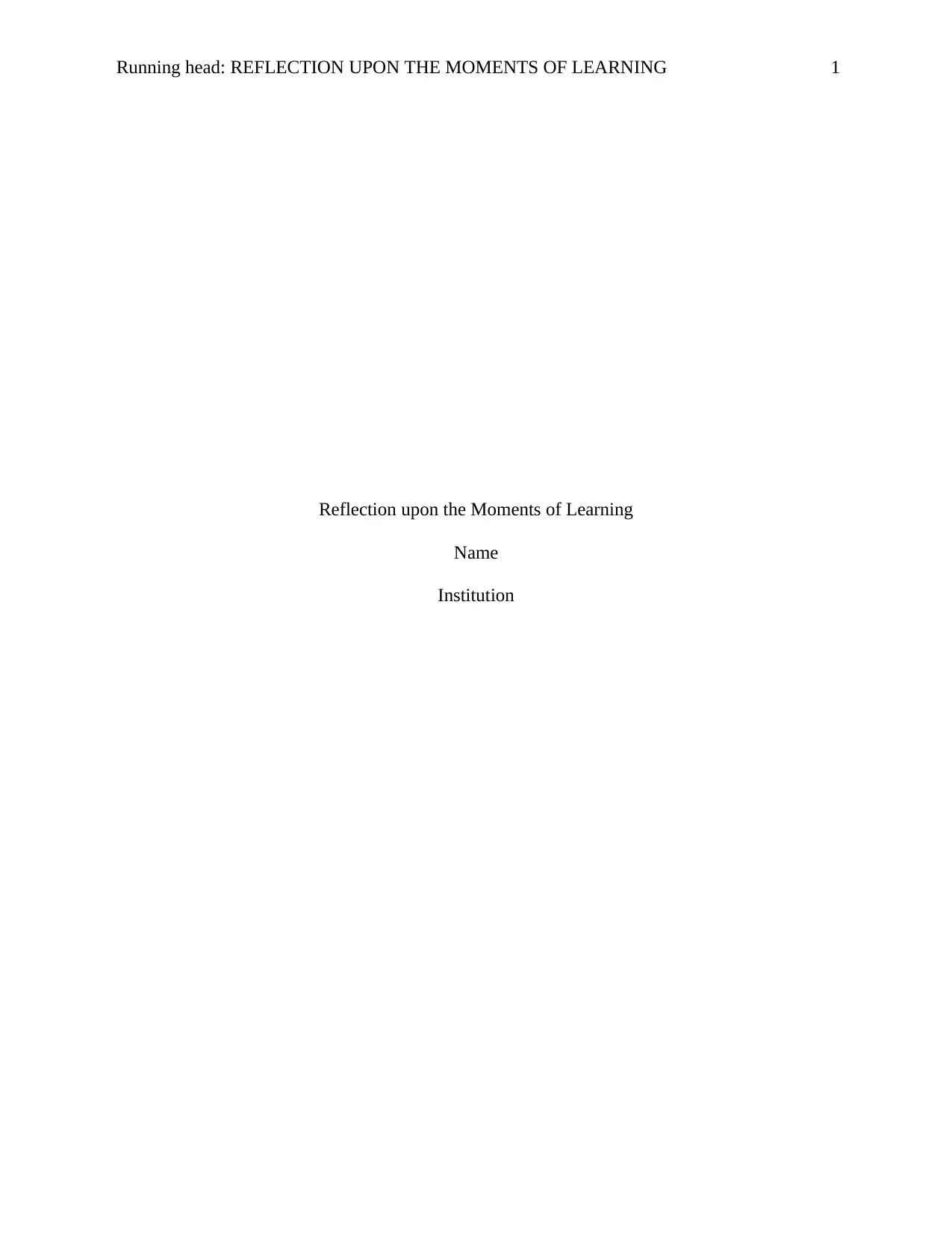
Running head: REFLECTION UPON THE MOMENTS OF LEARNING 1
Reflection upon the Moments of Learning
Name
Institution
Reflection upon the Moments of Learning
Name
Institution
Paraphrase This Document
Need a fresh take? Get an instant paraphrase of this document with our AI Paraphraser
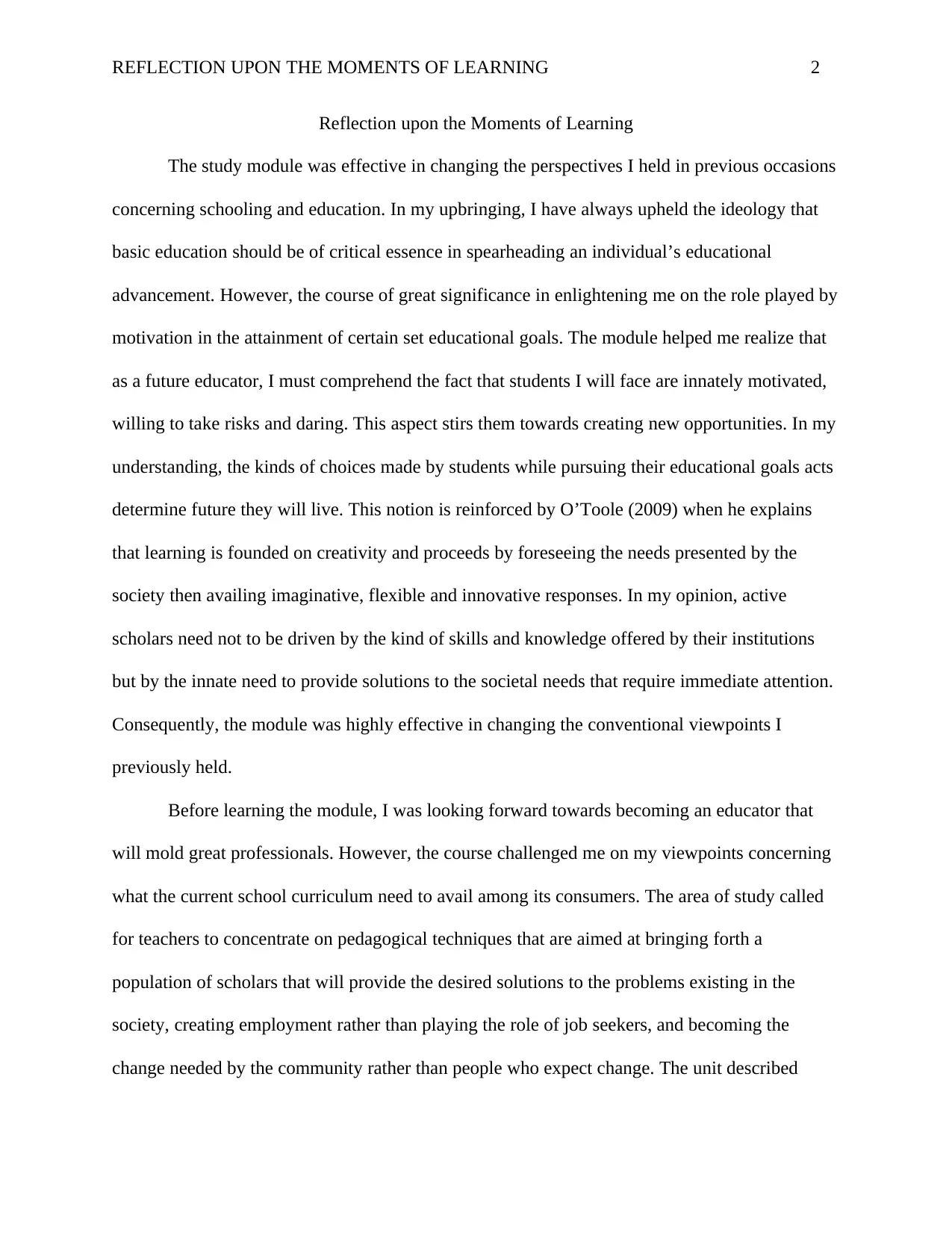
REFLECTION UPON THE MOMENTS OF LEARNING 2
Reflection upon the Moments of Learning
The study module was effective in changing the perspectives I held in previous occasions
concerning schooling and education. In my upbringing, I have always upheld the ideology that
basic education should be of critical essence in spearheading an individual’s educational
advancement. However, the course of great significance in enlightening me on the role played by
motivation in the attainment of certain set educational goals. The module helped me realize that
as a future educator, I must comprehend the fact that students I will face are innately motivated,
willing to take risks and daring. This aspect stirs them towards creating new opportunities. In my
understanding, the kinds of choices made by students while pursuing their educational goals acts
determine future they will live. This notion is reinforced by O’Toole (2009) when he explains
that learning is founded on creativity and proceeds by foreseeing the needs presented by the
society then availing imaginative, flexible and innovative responses. In my opinion, active
scholars need not to be driven by the kind of skills and knowledge offered by their institutions
but by the innate need to provide solutions to the societal needs that require immediate attention.
Consequently, the module was highly effective in changing the conventional viewpoints I
previously held.
Before learning the module, I was looking forward towards becoming an educator that
will mold great professionals. However, the course challenged me on my viewpoints concerning
what the current school curriculum need to avail among its consumers. The area of study called
for teachers to concentrate on pedagogical techniques that are aimed at bringing forth a
population of scholars that will provide the desired solutions to the problems existing in the
society, creating employment rather than playing the role of job seekers, and becoming the
change needed by the community rather than people who expect change. The unit described
Reflection upon the Moments of Learning
The study module was effective in changing the perspectives I held in previous occasions
concerning schooling and education. In my upbringing, I have always upheld the ideology that
basic education should be of critical essence in spearheading an individual’s educational
advancement. However, the course of great significance in enlightening me on the role played by
motivation in the attainment of certain set educational goals. The module helped me realize that
as a future educator, I must comprehend the fact that students I will face are innately motivated,
willing to take risks and daring. This aspect stirs them towards creating new opportunities. In my
understanding, the kinds of choices made by students while pursuing their educational goals acts
determine future they will live. This notion is reinforced by O’Toole (2009) when he explains
that learning is founded on creativity and proceeds by foreseeing the needs presented by the
society then availing imaginative, flexible and innovative responses. In my opinion, active
scholars need not to be driven by the kind of skills and knowledge offered by their institutions
but by the innate need to provide solutions to the societal needs that require immediate attention.
Consequently, the module was highly effective in changing the conventional viewpoints I
previously held.
Before learning the module, I was looking forward towards becoming an educator that
will mold great professionals. However, the course challenged me on my viewpoints concerning
what the current school curriculum need to avail among its consumers. The area of study called
for teachers to concentrate on pedagogical techniques that are aimed at bringing forth a
population of scholars that will provide the desired solutions to the problems existing in the
society, creating employment rather than playing the role of job seekers, and becoming the
change needed by the community rather than people who expect change. The unit described
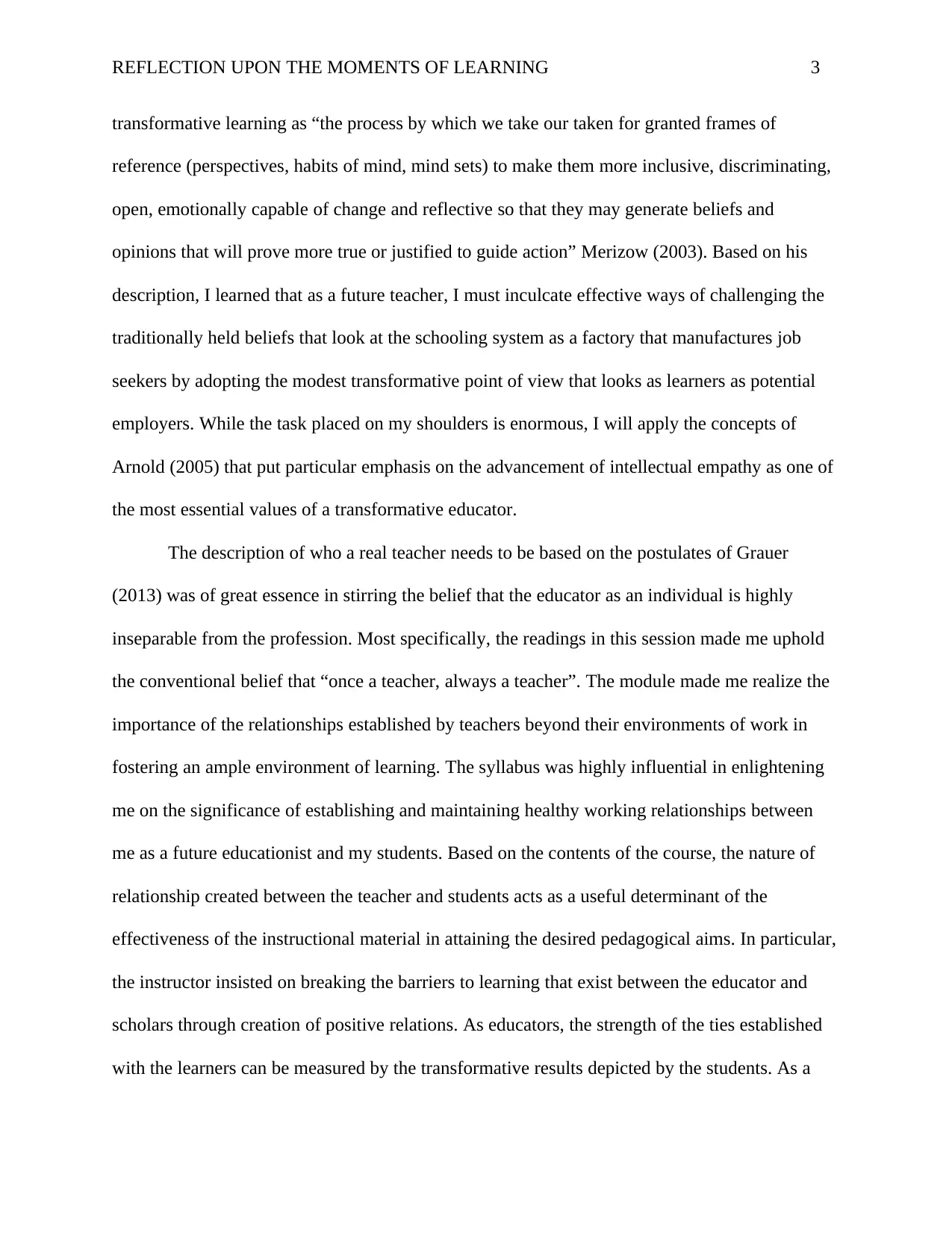
REFLECTION UPON THE MOMENTS OF LEARNING 3
transformative learning as “the process by which we take our taken for granted frames of
reference (perspectives, habits of mind, mind sets) to make them more inclusive, discriminating,
open, emotionally capable of change and reflective so that they may generate beliefs and
opinions that will prove more true or justified to guide action” Merizow (2003). Based on his
description, I learned that as a future teacher, I must inculcate effective ways of challenging the
traditionally held beliefs that look at the schooling system as a factory that manufactures job
seekers by adopting the modest transformative point of view that looks as learners as potential
employers. While the task placed on my shoulders is enormous, I will apply the concepts of
Arnold (2005) that put particular emphasis on the advancement of intellectual empathy as one of
the most essential values of a transformative educator.
The description of who a real teacher needs to be based on the postulates of Grauer
(2013) was of great essence in stirring the belief that the educator as an individual is highly
inseparable from the profession. Most specifically, the readings in this session made me uphold
the conventional belief that “once a teacher, always a teacher”. The module made me realize the
importance of the relationships established by teachers beyond their environments of work in
fostering an ample environment of learning. The syllabus was highly influential in enlightening
me on the significance of establishing and maintaining healthy working relationships between
me as a future educationist and my students. Based on the contents of the course, the nature of
relationship created between the teacher and students acts as a useful determinant of the
effectiveness of the instructional material in attaining the desired pedagogical aims. In particular,
the instructor insisted on breaking the barriers to learning that exist between the educator and
scholars through creation of positive relations. As educators, the strength of the ties established
with the learners can be measured by the transformative results depicted by the students. As a
transformative learning as “the process by which we take our taken for granted frames of
reference (perspectives, habits of mind, mind sets) to make them more inclusive, discriminating,
open, emotionally capable of change and reflective so that they may generate beliefs and
opinions that will prove more true or justified to guide action” Merizow (2003). Based on his
description, I learned that as a future teacher, I must inculcate effective ways of challenging the
traditionally held beliefs that look at the schooling system as a factory that manufactures job
seekers by adopting the modest transformative point of view that looks as learners as potential
employers. While the task placed on my shoulders is enormous, I will apply the concepts of
Arnold (2005) that put particular emphasis on the advancement of intellectual empathy as one of
the most essential values of a transformative educator.
The description of who a real teacher needs to be based on the postulates of Grauer
(2013) was of great essence in stirring the belief that the educator as an individual is highly
inseparable from the profession. Most specifically, the readings in this session made me uphold
the conventional belief that “once a teacher, always a teacher”. The module made me realize the
importance of the relationships established by teachers beyond their environments of work in
fostering an ample environment of learning. The syllabus was highly influential in enlightening
me on the significance of establishing and maintaining healthy working relationships between
me as a future educationist and my students. Based on the contents of the course, the nature of
relationship created between the teacher and students acts as a useful determinant of the
effectiveness of the instructional material in attaining the desired pedagogical aims. In particular,
the instructor insisted on breaking the barriers to learning that exist between the educator and
scholars through creation of positive relations. As educators, the strength of the ties established
with the learners can be measured by the transformative results depicted by the students. As a
⊘ This is a preview!⊘
Do you want full access?
Subscribe today to unlock all pages.

Trusted by 1+ million students worldwide
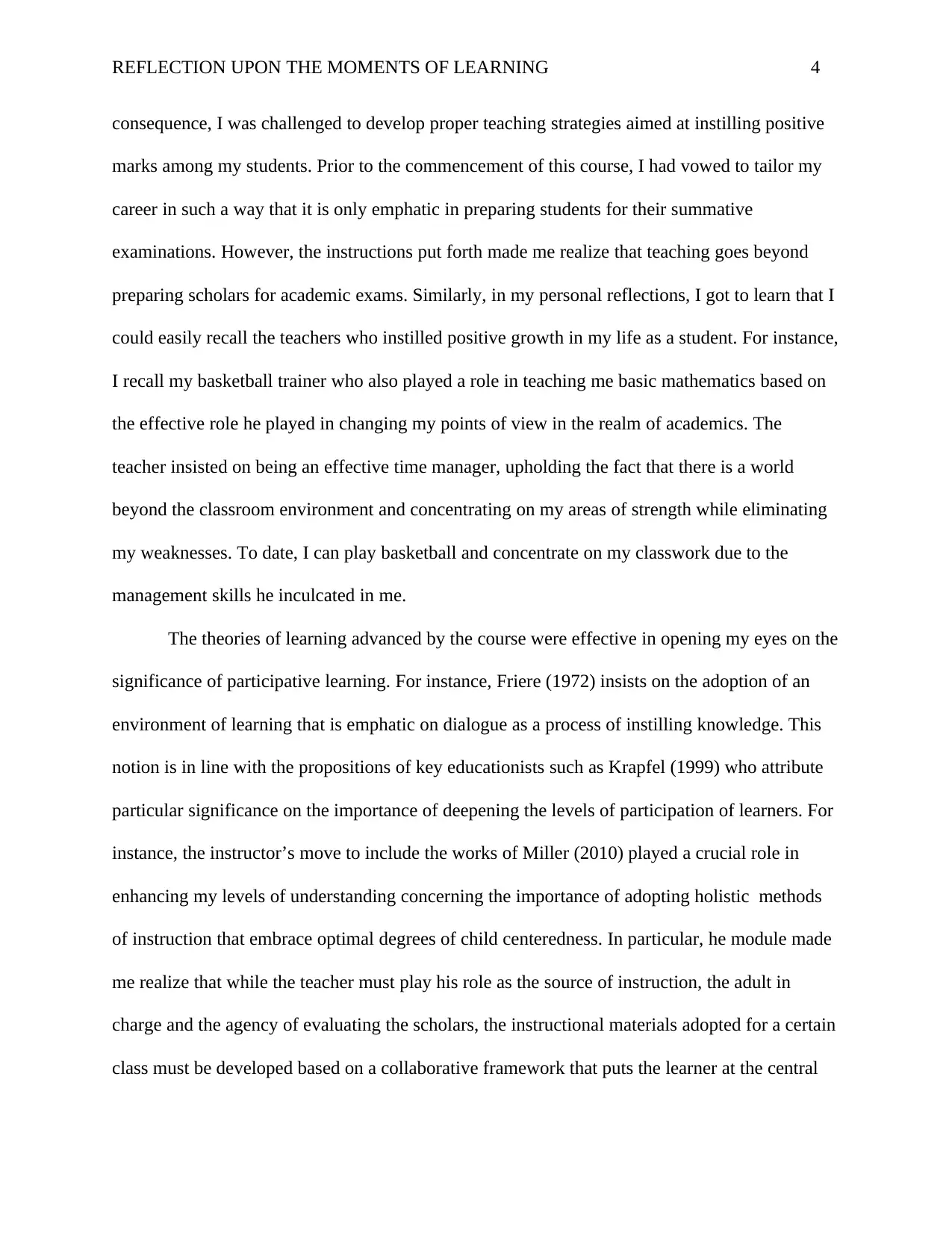
REFLECTION UPON THE MOMENTS OF LEARNING 4
consequence, I was challenged to develop proper teaching strategies aimed at instilling positive
marks among my students. Prior to the commencement of this course, I had vowed to tailor my
career in such a way that it is only emphatic in preparing students for their summative
examinations. However, the instructions put forth made me realize that teaching goes beyond
preparing scholars for academic exams. Similarly, in my personal reflections, I got to learn that I
could easily recall the teachers who instilled positive growth in my life as a student. For instance,
I recall my basketball trainer who also played a role in teaching me basic mathematics based on
the effective role he played in changing my points of view in the realm of academics. The
teacher insisted on being an effective time manager, upholding the fact that there is a world
beyond the classroom environment and concentrating on my areas of strength while eliminating
my weaknesses. To date, I can play basketball and concentrate on my classwork due to the
management skills he inculcated in me.
The theories of learning advanced by the course were effective in opening my eyes on the
significance of participative learning. For instance, Friere (1972) insists on the adoption of an
environment of learning that is emphatic on dialogue as a process of instilling knowledge. This
notion is in line with the propositions of key educationists such as Krapfel (1999) who attribute
particular significance on the importance of deepening the levels of participation of learners. For
instance, the instructor’s move to include the works of Miller (2010) played a crucial role in
enhancing my levels of understanding concerning the importance of adopting holistic methods
of instruction that embrace optimal degrees of child centeredness. In particular, he module made
me realize that while the teacher must play his role as the source of instruction, the adult in
charge and the agency of evaluating the scholars, the instructional materials adopted for a certain
class must be developed based on a collaborative framework that puts the learner at the central
consequence, I was challenged to develop proper teaching strategies aimed at instilling positive
marks among my students. Prior to the commencement of this course, I had vowed to tailor my
career in such a way that it is only emphatic in preparing students for their summative
examinations. However, the instructions put forth made me realize that teaching goes beyond
preparing scholars for academic exams. Similarly, in my personal reflections, I got to learn that I
could easily recall the teachers who instilled positive growth in my life as a student. For instance,
I recall my basketball trainer who also played a role in teaching me basic mathematics based on
the effective role he played in changing my points of view in the realm of academics. The
teacher insisted on being an effective time manager, upholding the fact that there is a world
beyond the classroom environment and concentrating on my areas of strength while eliminating
my weaknesses. To date, I can play basketball and concentrate on my classwork due to the
management skills he inculcated in me.
The theories of learning advanced by the course were effective in opening my eyes on the
significance of participative learning. For instance, Friere (1972) insists on the adoption of an
environment of learning that is emphatic on dialogue as a process of instilling knowledge. This
notion is in line with the propositions of key educationists such as Krapfel (1999) who attribute
particular significance on the importance of deepening the levels of participation of learners. For
instance, the instructor’s move to include the works of Miller (2010) played a crucial role in
enhancing my levels of understanding concerning the importance of adopting holistic methods
of instruction that embrace optimal degrees of child centeredness. In particular, he module made
me realize that while the teacher must play his role as the source of instruction, the adult in
charge and the agency of evaluating the scholars, the instructional materials adopted for a certain
class must be developed based on a collaborative framework that puts the learner at the central
Paraphrase This Document
Need a fresh take? Get an instant paraphrase of this document with our AI Paraphraser
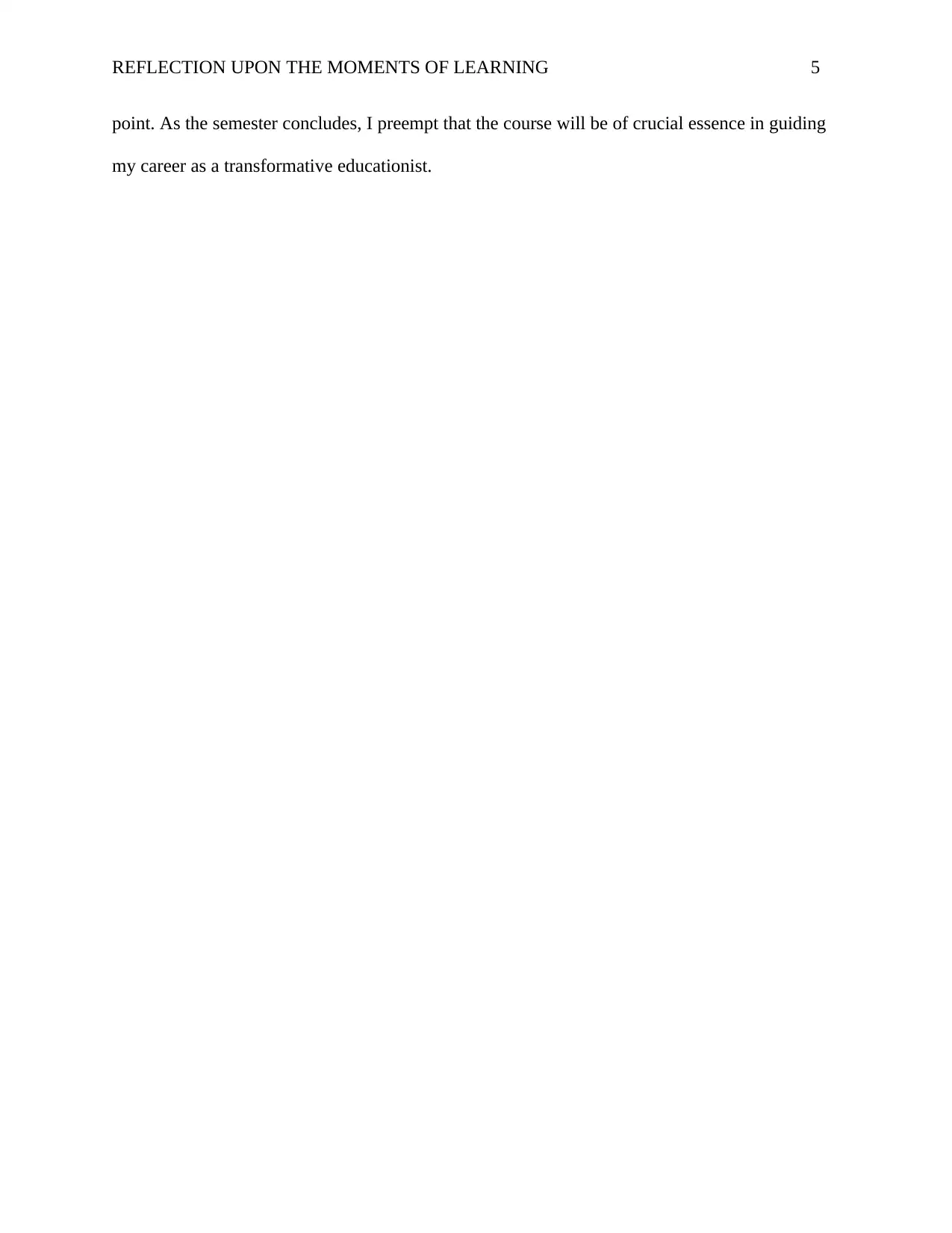
REFLECTION UPON THE MOMENTS OF LEARNING 5
point. As the semester concludes, I preempt that the course will be of crucial essence in guiding
my career as a transformative educationist.
point. As the semester concludes, I preempt that the course will be of crucial essence in guiding
my career as a transformative educationist.
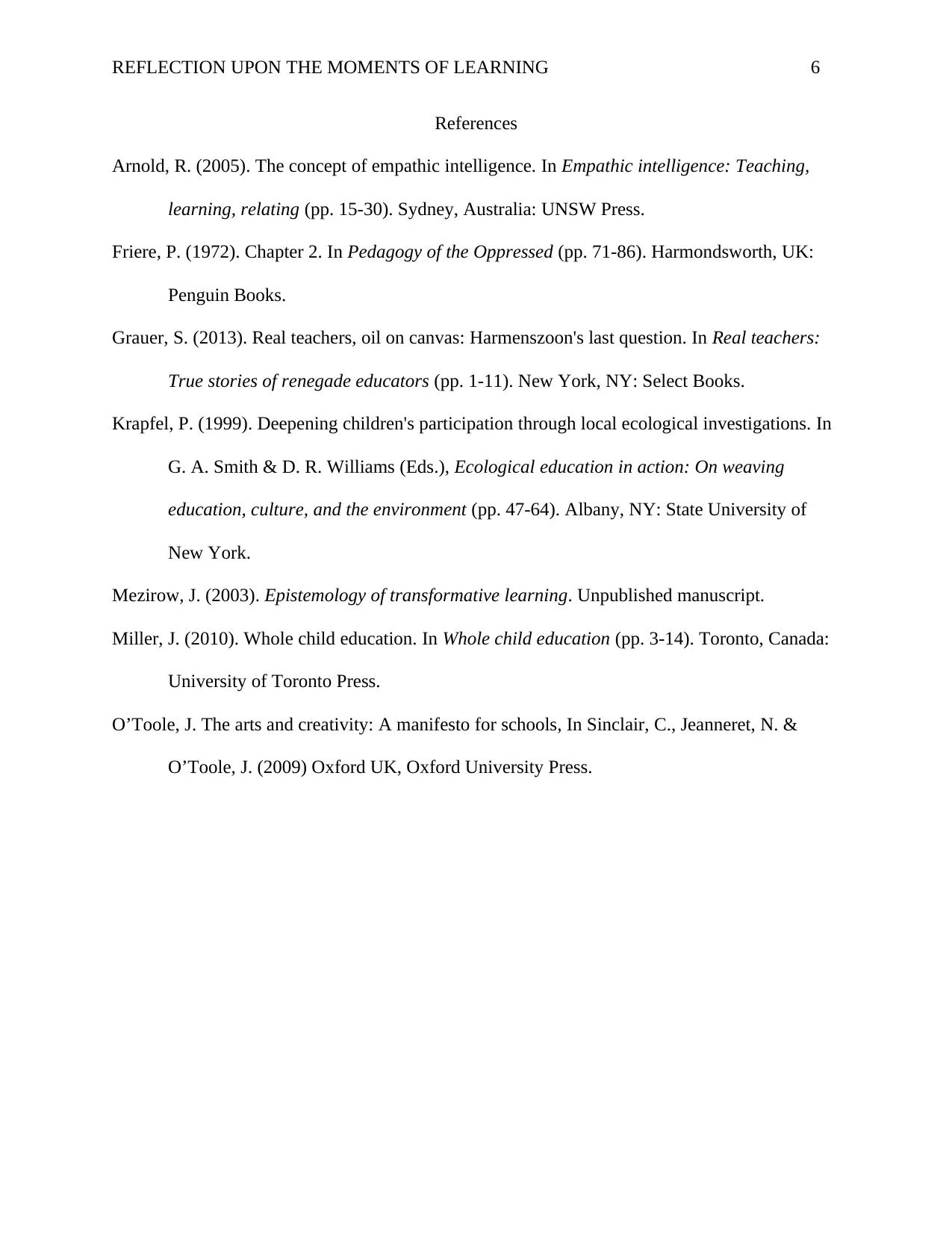
REFLECTION UPON THE MOMENTS OF LEARNING 6
References
Arnold, R. (2005). The concept of empathic intelligence. In Empathic intelligence: Teaching,
learning, relating (pp. 15-30). Sydney, Australia: UNSW Press.
Friere, P. (1972). Chapter 2. In Pedagogy of the Oppressed (pp. 71-86). Harmondsworth, UK:
Penguin Books.
Grauer, S. (2013). Real teachers, oil on canvas: Harmenszoon's last question. In Real teachers:
True stories of renegade educators (pp. 1-11). New York, NY: Select Books.
Krapfel, P. (1999). Deepening children's participation through local ecological investigations. In
G. A. Smith & D. R. Williams (Eds.), Ecological education in action: On weaving
education, culture, and the environment (pp. 47-64). Albany, NY: State University of
New York.
Mezirow, J. (2003). Epistemology of transformative learning. Unpublished manuscript.
Miller, J. (2010). Whole child education. In Whole child education (pp. 3-14). Toronto, Canada:
University of Toronto Press.
O’Toole, J. The arts and creativity: A manifesto for schools, In Sinclair, C., Jeanneret, N. &
O’Toole, J. (2009) Oxford UK, Oxford University Press.
References
Arnold, R. (2005). The concept of empathic intelligence. In Empathic intelligence: Teaching,
learning, relating (pp. 15-30). Sydney, Australia: UNSW Press.
Friere, P. (1972). Chapter 2. In Pedagogy of the Oppressed (pp. 71-86). Harmondsworth, UK:
Penguin Books.
Grauer, S. (2013). Real teachers, oil on canvas: Harmenszoon's last question. In Real teachers:
True stories of renegade educators (pp. 1-11). New York, NY: Select Books.
Krapfel, P. (1999). Deepening children's participation through local ecological investigations. In
G. A. Smith & D. R. Williams (Eds.), Ecological education in action: On weaving
education, culture, and the environment (pp. 47-64). Albany, NY: State University of
New York.
Mezirow, J. (2003). Epistemology of transformative learning. Unpublished manuscript.
Miller, J. (2010). Whole child education. In Whole child education (pp. 3-14). Toronto, Canada:
University of Toronto Press.
O’Toole, J. The arts and creativity: A manifesto for schools, In Sinclair, C., Jeanneret, N. &
O’Toole, J. (2009) Oxford UK, Oxford University Press.
⊘ This is a preview!⊘
Do you want full access?
Subscribe today to unlock all pages.

Trusted by 1+ million students worldwide
1 out of 6
Related Documents
Your All-in-One AI-Powered Toolkit for Academic Success.
+13062052269
info@desklib.com
Available 24*7 on WhatsApp / Email
![[object Object]](/_next/static/media/star-bottom.7253800d.svg)
Unlock your academic potential
Copyright © 2020–2026 A2Z Services. All Rights Reserved. Developed and managed by ZUCOL.





